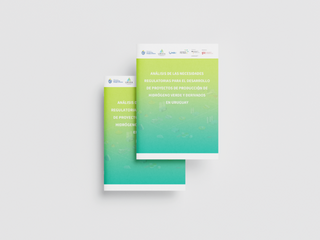
German-Uruguayan Energy Partnership
Uruguay, with its vast renewable energy resources and progressive energy policies, stands as an attractive partner for Germany. The country's energy sector, powered by over 96% renewables, with wind energy comprising about 30%, is moving towards a "second energy transition" targeting decarbonization of heat and transport sectors. Unique in the emerging hydrogen economy, Uruguay's biogenic CO2 sources from forestry enable sustainable green methanol production, offering a promising avenue for investments necessary for complete decarbonization and presenting win-win opportunities for both nations in renewable energy and beyond.
In March 2023, the signing of the Joint Declaration of Intent (JDOI) by Minister Paganini and Federal Minister Habeck laid the groundwork for the Bilateral Energy Partnership between both countries. In the first year, the Energy Partnership was underscored by significant studies on hydrogen production conditions, and advanced discussions on green methanol trade, solidifying Uruguay's status as a renewable energy leader in Latin America with a high potential to export green methanol to Germany. The activities reflect the shared commitment to fostering sustainable investment environments and knowledge exchange.
The activities in green hydrogen were mainly carried out through the BMWK projects PtX Hub and H2Uppp, implemented by Deutsche Gesellschaft für Internationale Zusammenarbeit (GIZ) GmbH alongside the German Chamber of Commerce (AHK). Key outcomes include drafting crucial hydrogen legislation, identifying biogenic CO2 sources, and establishing a business-led hydrogen initiative group, marking substantial progress towards a decarbonised energy sector. These efforts are poised to catalyse long-term impacts, such as enhanced bilateral trade and investment opportunities, and a robust framework for sustainable energy collaboration.
In 2024, two bilateral working groups were established to focus on green hydrogen and derivatives as well as energy efficiency.
The partnership's energy efficiency endeavours, carried out by the German Energy Agency (dena), AHK and GIZ, focus on opening market potentials for German enterprises through workshops, studies, and strategic planning, demonstrating the synergy between German expertise and Uruguayan renewable ambitions. Together with partners from Uruguay, a work plan is developed each year.
Looking forward, the partnership aims to refine and implement comprehensive strategies on green hydrogen derivatives, energy efficiency in various industrial sectors and electromobility to ensure continued growth and innovation in renewable energy, reinforcing the Germany’s and Uruguay's commitment to a sustainable, energy-efficient future.
Publications
Analysis of CO2 availability for the production of Power-to-X products in Uruguay

This study identifies, quantifies, and georeferences the main CO2 sources in Uruguay, focusing on Power-to-X projects. It includes a case study on methanol production, emphasising CO2 capture, equipment sizing, and a pre-feasibility technical-economic analysis. Additionally, it provides a model for calculating the Levelised Cost of Methanol (LCOMe).
Analysis of regulatory needs for the development of green hydrogen production projects and derivates in Uruguay

The study reviews Uruguay’s green hydrogen regulations, emphasizing security, compares them with international standards, and proposes a regulatory framework aligned with these standards. It also includes regulatory schemes for three green hydrogen production case studies and a proposal for hydrogen quality standards.
Key Information
Contact data
Daina Neddemeyer
Head of Secretariat
+ 56 9 42 199 188
Write E-Mail
Contact data
Stephan Franz
Component Leader Team Germany
+49 30 3384 24-187
Write E-Mail